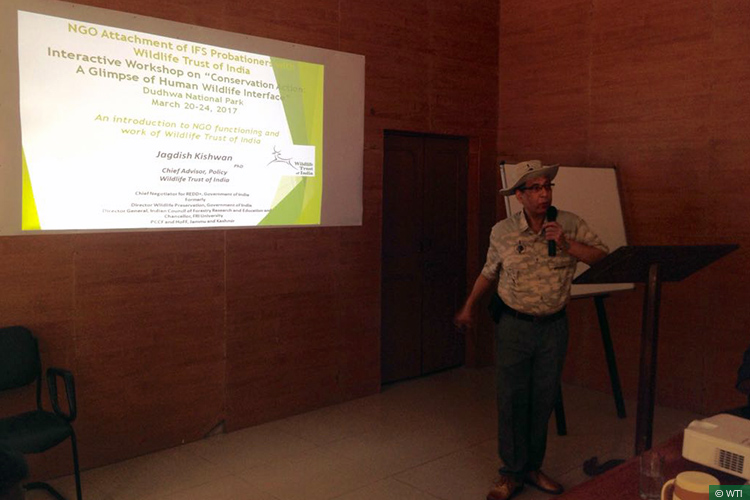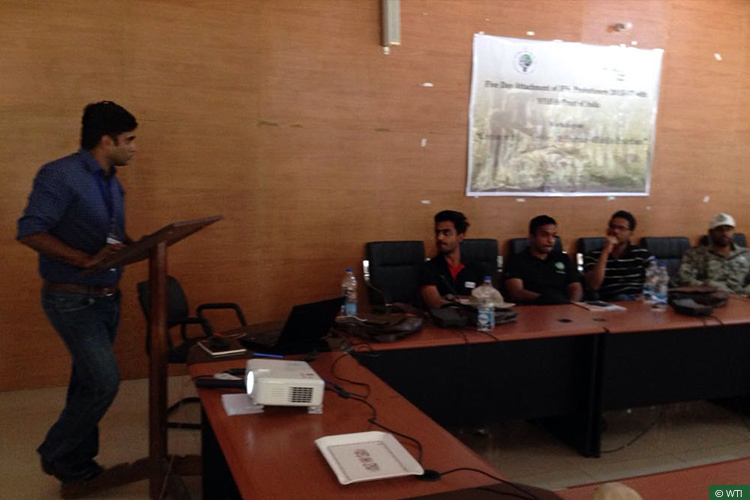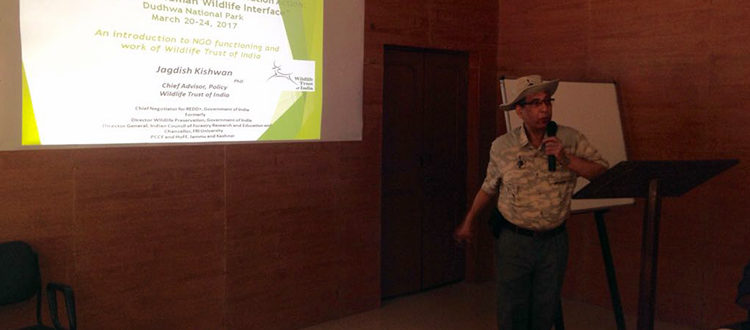WTI Commences Training Workshop on Human-Wildlife Interface for Probationers of the Indira Gandhi National Forest Academy
Dudhwa Tiger Reserve, March 20, 2017: Wildlife Trust of India (WTI) this morning commenced a five-day training workshop for 14 IFS probationers from the Indira Gandhi National Forest Academy (IGNFA). The workshop, titled “Conservation Action: Focus on Human-Wildlife Interface”, is part of IGNFA’s NGO attachment programme for probationers of the 2015-17 course.
The participating IFS officers belong to the Assam, Punjab, Himachal Pradesh, Uttarakhand, Chhattisgarh and Meghalaya cadres. Over the next five days they will interact with various resource persons from WTI, learning about the functioning of a wildlife conservation NGO with a particular focus on subjects related to human-wildlife interface.
 Dr Jagdish Kishwan, WTI’s Chief Policy Advisor conducts a classroom session on the first day of the training workshop
Dr Jagdish Kishwan, WTI’s Chief Policy Advisor conducts a classroom session on the first day of the training workshop
Technical classroom sessions on, among other topics, wildlife trade and law enforcement, wildlife rescue and rehabilitation, human-wildlife conflict mitigation, the effect of linear infrastructure on biodiversity, and identification and securement of wildlife corridors will be held over the course of the workshop. In addition, the probationers will be exposed to field sessions on chemical capture and immobilisation of wild animals, the use of remote controlled vehicles in conflict management, technical rope rescues, mock-drills on large carnivore conflict management etc.
The workshop began this morning with the participants being introduced and Amit Chauhan, IFS, Punjab cadre and group leader of the probationers, communicating their collective expectations: “We look forward to learning about new aspects of conservation action, including equipment and methods for safely capturing conflict animals, achieving better conviction rates in wildlife crime cases through meticulous documentation and investigation, and also how NGOs like WTI write their grant proposals and reports for fundraising”, he said.
“We are glad that IGNFA is collaborating with a reputed NGO like WTI for training the 2015-17 batch of IFS officers on practical conservation action.”
In the first technical session Dr Jagdish Kishwan, WTI’s Chief Policy Advisor who has also had extensive experience working in senior positions in the government, outlined the similarities and differences between the functioning of an NGO and a governmental agency. He underscored how WTI has assisted the forest departments of various states in achieving their conservation goals. “This workshop will provide a good opportunity for WTI resource persons to share their expertise and experiences with the young IFS officers. We anticipate that the relationship built here between the organisation and the young officers will last well beyond the end of the workshop, continuing when they join their respective cadres.”
Jose Louies, WTI’s Head – Wildlife Trade and Law Enforcement conducted the second technical session of the day, presenting an overview of the economic, biological and political impact of the illegal trade in wildlife and its derivatives, especially related to elephant ivory, rhino horn, tiger skins and the live animal pet trade. He also took the participants through the details of a case in 2015 wherein WTI and the Wildlife Crime Control Bureau had assisted the Kerala Forest Department in an investigation that led to the seizure of over 500kg of contraband ivory. The theoretical session was followed by a group activity involving the framing of charges against a poacher who had been arrested with jaw traps inside a Protected Area. Two groups were formed and each was asked to identify relevant sections of the Wild Life (Protection) Act, 1972, under which the accused could be charged. Mr Louies outlined the most common mistakes that are made while preparing the Preliminary Offence Report (POR) and highlighted ways to minimise these to make a stronger case. He concluded the session by discussing some of the newer techniques of detecting and investigating wildlife crime.
 Jose Louies, Head – Wildlife Trade and Law Enforcement, WTI conducts a session on wildlife crime investigation and wildlife trade
Jose Louies, Head – Wildlife Trade and Law Enforcement, WTI conducts a session on wildlife crime investigation and wildlife trade
Over the next five days, other WTI resource persons including Sandeep Tiwari, Head, Wild Lands; Dr NVK Ashraf, Senior Director and Chief Veterinarian; Dr Mayukh Chatterjee, Head, Wildlife Conflict Mitigation; Abhishek Narayanan, Head, Wildlife Rescue and Rehabilitation; Rudra Mahapatra, Regional Facilitator, Odisha; and Prem Chandra Pandey, Sociologist will conduct classroom interactions as well as outdoor sessions.
“We are glad that IGNFA is collaborating with a reputed NGO like WTI for training the 2015-17 batch of IFS officers on practical conservation action. I hope this collaboration continues for the next batches and many years to come”, said Dr Uttam Kumar, Course Director, IGNFA.
Mr Sunil Choudhary, IFS, Director, Dudhwa Tiger Reserve said: “We are proud that IGNFA and WTI selected Dudhwa Tiger Reserve based on its conservation status and successful management of human-big cat conflict in this landscape. I would like the IFS officers to get acquainted with the good work being done for conservation of wild animals in Dudhwa, and use this experience fruitfully when they start working in their allotted states”.
“Dudhwa is the ideal place to hold such a workshop as it not only has all the requisite facilities but also one of the highest incidences of human-large carnivore conflict in India”, said Dr Mayukh Chatterjee. “It is important that young officers like these are exposed to modern approaches to human-wildlife conflict mitigation, especially those that focus on community participation and integration, so that they can adopt these approaches during their tenures as Forest Officers”, he added.
“It is great to see that young IFS officers are participating in such workshops and institutes like IGNFA are promoting NGO attachments for wildlife conservation activities”, Abhishek Narayanan affirmed. “An orientation programme on NGO functioning such as this is very important for a charting out a collaborative approach in achieving the common conservation goals of government, training institutions and civil society.”









